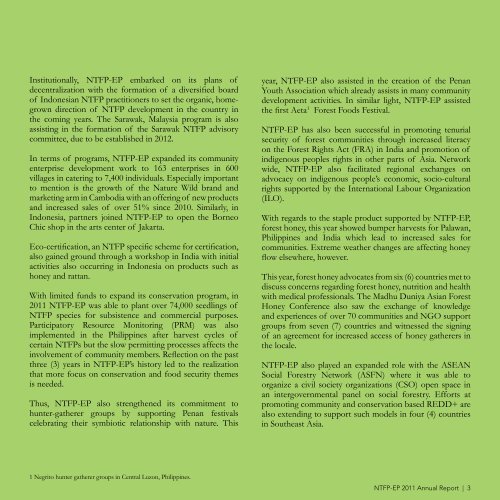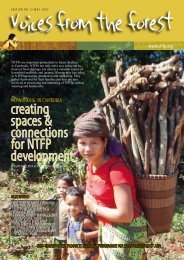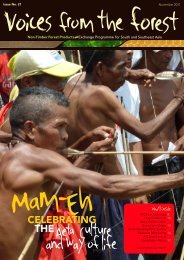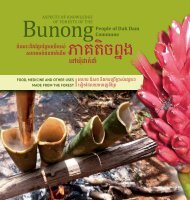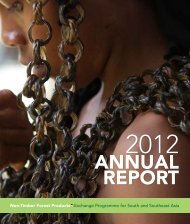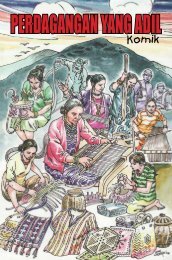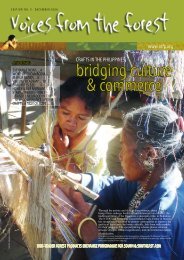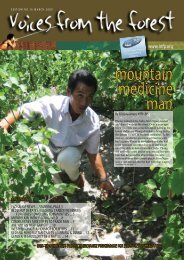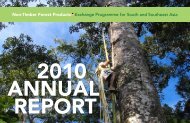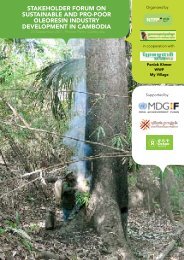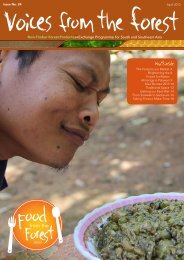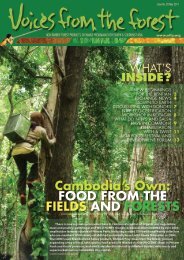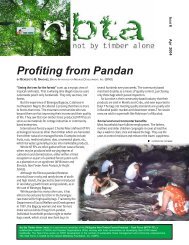Download PDF - Non-Timber Forest Products Exchange Programme
Download PDF - Non-Timber Forest Products Exchange Programme
Download PDF - Non-Timber Forest Products Exchange Programme
- No tags were found...
You also want an ePaper? Increase the reach of your titles
YUMPU automatically turns print PDFs into web optimized ePapers that Google loves.
Institutionally, NTFP-EP embarked on its plans ofdecentralization with the formation of a diversified boardof Indonesian NTFP practitioners to set the organic, homegrowndirection of NTFP development in the country inthe coming years. The Sarawak, Malaysia program is alsoassisting in the formation of the Sarawak NTFP advisorycommittee, due to be established in 2012.In terms of programs, NTFP-EP expanded its communityenterprise development work to 163 enterprises in 600villages in catering to 7,400 individuals. Especially importantto mention is the growth of the Nature Wild brand andmarketing arm in Cambodia with an offering of new productsand increased sales of over 51% since 2010. Similarly, inIndonesia, partners joined NTFP-EP to open the BorneoChic shop in the arts center of Jakarta.Eco-certification, an NTFP specific scheme for certification,also gained ground through a workshop in India with initialactivities also occurring in Indonesia on products such ashoney and rattan.With limited funds to expand its conservation program, in2011 NTFP-EP was able to plant over 74,000 seedlings ofNTFP species for subsistence and commercial purposes.Participatory Resource Monitoring (PRM) was alsoimplemented in the Philippines after harvest cycles ofcertain NTFPs but the slow permitting processes affects theinvolvement of community members. Reflection on the pastthree (3) years in NTFP-EP’s history led to the realizationthat more focus on conservation and food security themesis needed.Thus, NTFP-EP also strengthened its commitment tohunter-gatherer groups by supporting Penan festivalscelebrating their symbiotic relationship with nature. Thisyear, NTFP-EP also assisted in the creation of the PenanYouth Association which already assists in many communitydevelopment activities. In similar light, NTFP-EP assistedthe first Aeta 1 <strong>Forest</strong> Foods Festival.NTFP-EP has also been successful in promoting tenurialsecurity of forest communities through increased literacyon the <strong>Forest</strong> Rights Act (FRA) in India and promotion ofindigenous peoples rights in other parts of Asia. Networkwide, NTFP-EP also facilitated regional exchanges onadvocacy on indigenous people’s economic, socio-culturalrights supported by the International Labour Organization(ILO).With regards to the staple product supported by NTFP-EP,forest honey, this year showed bumper harvests for Palawan,Philippines and India which lead to increased sales forcommunities. Extreme weather changes are affecting honeyflow elsewhere, however.This year, forest honey advocates from six (6) countries met todiscuss concerns regarding forest honey, nutrition and healthwith medical professionals. The Madhu Duniya Asian <strong>Forest</strong>Honey Conference also saw the exchange of knowledgeand experiences of over 70 communities and NGO supportgroups from seven (7) countries and witnessed the signingof an agreement for increased access of honey gatherers inthe locale.NTFP-EP also played an expanded role with the ASEANSocial <strong>Forest</strong>ry Network (ASFN) where it was able toorganize a civil society organizations (CSO) open space inan intergovernmental panel on social forestry. Efforts atpromoting community and conservation based REDD+ arealso extending to support such models in four (4) countriesin Southeast Asia.1 Negrito hunter gatherer groups in Central Luzon, Philippines.NTFP-EP 2011 Annual Report | 3


